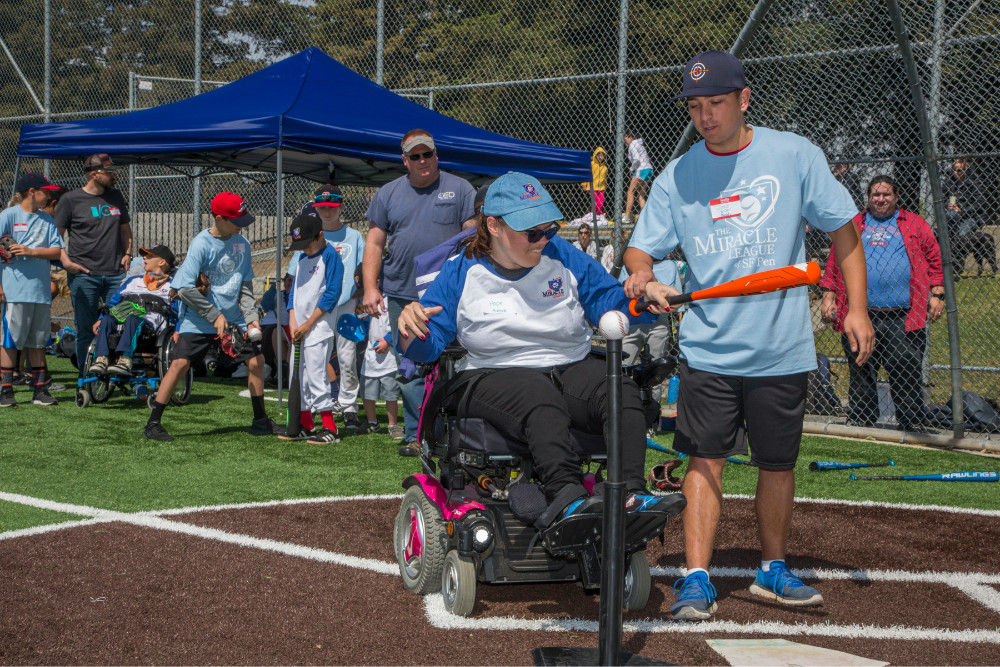The motto is simple: Everybody deserves to play baseball.
The San Francisco Peninsula chapter of the Miracle League, a nonprofit that helps children and adults with mental and physical disabilities take the field, was started by brothers Gary and Scott Morton in 2018. They adopted the concept from the larger Miracle League, which claims more than 240 individual organizations for disabled ballplayers throughout the U.S. and Canada.
In Redwood City, the Mortons’ enterprise was an immediate hit. Then, just two years later, Covid knocked the whole operation out of the park.
The Mortons and members of the board scrambled to keep from losing momentum.
“We held a few virtual activities and did our best to stay in touch, with handwritten cards on holidays and sending out cutout face masks,” Scott says. “But it was a far cry from having in-person games.”
Many of the league’s players have serious physical conditions that make them susceptible to infections such as Covid. Even as other local youth sports started again, the league’s brass chose not to tempt fate and waited until this past April.
“We were very cautious,” Scott says. “Two of our board members have children in the league, so we took our lead from them as to when it would be safe to resume playing.”
Searching for a New Field
Ever since starting their Redwood City “franchise,” the Morton brothers have yearned for a field designed specifically for the organization’s athletes, in the same way the Magical Bridge playground at Red Morton Park serves disabled children and their families. Games are currently played on the grounds of now-closed Hawes Elementary School, on Roosevelt Ave.
Miracle League supporters recently appeared before the city’s Parks, Recreation and Community Services Commission, which unanimously recommended the development of a conceptual plan to build an inclusive sports facility at Mitchell field in the Red Morton complex.
—
This story first appeared in the August edition of Climate Magazine
—
For Redwood City Parks, Recreation and Community Services Director Chris Beth, a suitable field is a high priority. “The Miracle League really ties into our desire to provide recreation access to all, and we recognize the need for a special field like this,” he says.
Relying on Volunteers
On average, 15 players are assigned to each of the league’s four teams (two for youths and two for adults). Each player is paired with an able-bodied “ buddy,” who assists. That’s 60 people per game, half of them volunteers. Multiply that by two games per day, then add more adult helpers, and the number of needed volunteers can easily climb to 200 on an afternoon.
But, the Mortons say, it’s become hard to find people ready to pitch in. Parents are key; they transport their kids to games and often stick around to help. In talking with other youth sports associations, however, Scott discovered a broad trend: Players far outnumber the parents who are willing to assist.
“It seems logical when I think about it, that after two years of youth not being able to play (because of Covid), the kids are out and ready to tear it up,” he says. “But over those same two years, adults have become disconnected.”
Enter the Young Men’s Service League of Menlo Park, an organization of mothers and sons working together to improve the local community. The group has become the main contributor of buddies who play with the disabled athletes. And the league has enjoyed an unexpected bonus. Scott says that on any given game day, “a good third of the mothers stay and help out.”
Spreading Across the Continent
The larger Miracle League’s website says the organization represents “more than playing a game,” noting participants make new friends and gain self-esteem. The league has existed since 2000, when its first field opened in an Atlanta suburb. During the next two years, chapters sprouted in South Carolina, Alabama, West Virginia, Illinois and California. The organization says it currently serves more than 200,000 children and adults. It adds that it “has an aggressive plan to help local communities build Miracle League complexes around the globe.”
More information about the San Francisco Peninsula Miracle League: www.miracleleaguesfpen.com.






